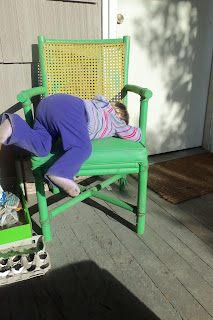The Grand Miracle: Poem by Mary Karr
This poem is from one of my my favorite poets. Mary Karr.
The Grand Miracle
Jesus wound up with his body nailed to a tree—
a torment he practically begged for,
or at least did nothing to stop. Pilate
watched the crowd go thumbs down
and weary, signed the order.
So centurions laid Jesus flat
on a long beam, arms run along the crosspiece.
In each palm a long spike was centered,
a stone chosen to drive it. (Skin
tears; the bones start to split.)
Once the cross got propped up,
the body hung heavy, a carcass—
in carne, the Latin poets say, in meat.
(—The breastbone a ship's prow . . .)
At the end the man cried out
as men cry. (Tears that fill the eyes
grow dark drop and by drop: One
cries out.) On the third day,
the stone rolled back, to reveal
no corpse. History is rife
with such hoaxes. (Look at Herodotus.)
As to whether he multiplied
loaves and fishes, that's common enough.
Poke seed-corn in a hole and see if more corn
doesn't grow. Two fish in a pond
make more fishes. The altar of reason
supports such extravagance. (I don't even know
how electricity works, but put trust
in light switches.) And the prospect
of love cheers me up, as gospel.
That some creator might strap on
an animal mask to travel our path between birth
and ignominious death—now that
makes me less lonely. And the rising up
at the end into glory—the white circle of bread
on the meat of each tongue that God
might enter us. For 2000-near years
my tribe has lined up at various altars,
so dumbly I open this mouth for bread and song. a torment he practically begged for, or at least did nothing to stop. Pilate
watched the crowd go thumbs down
and weary, signed the order.
So centurions laid Jesus flat
on a long beam, arms run along the crosspiece.
In each palm a long spike was centered,
a stone chosen to drive it. (Skin
tears; the bones start to split.)
Once the cross got propped up,
the body hung heavy, a carcass—
in carne, the Latin poets say, in meat.
(—The breastbone a ship's prow . . .)
At the end the man cried out
as men cry. (Tears that fill the eyes
grow dark drop and by drop: One
cries out.) On the third day,
the stone rolled back, to reveal
no corpse. History is rife
with such hoaxes. (Look at Herodotus.)
As to whether he multiplied
loaves and fishes, that's common enough.
Poke seed-corn in a hole and see if more corn
doesn't grow. Two fish in a pond
make more fishes. The altar of reason
supports such extravagance. (I don't even know
how electricity works, but put trust
in light switches.) And the prospect
of love cheers me up, as gospel.
That some creator might strap on
an animal mask to travel our path between birth
and ignominious death—now that
makes me less lonely. And the rising up
at the end into glory—the white circle of bread
on the meat of each tongue that God
might enter us. For 2000-near years
my tribe has lined up at various altars,
so dumbly I open this mouth for bread and song.

Comments
Post a Comment